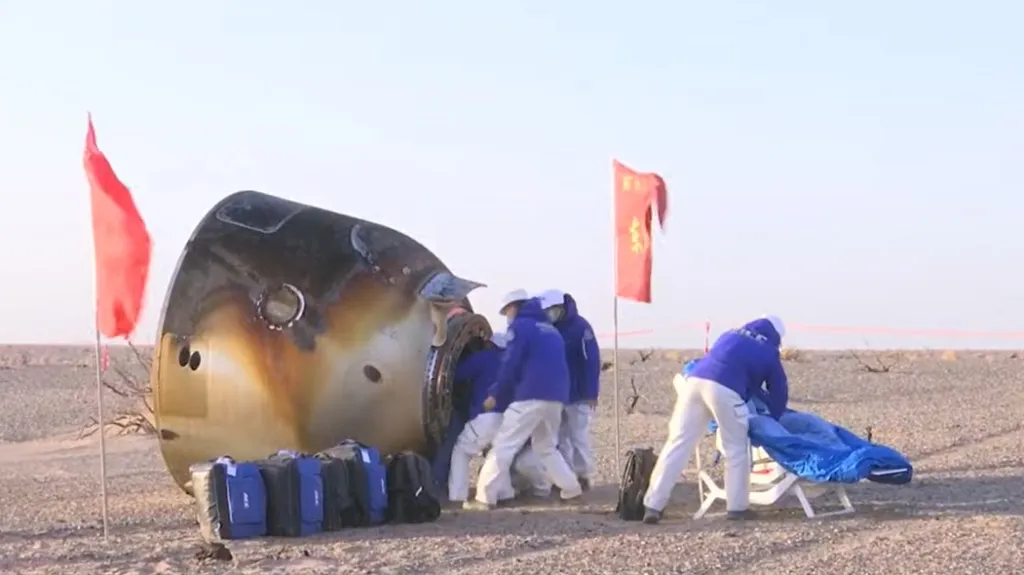Science
Chinese Astronauts Safely Return After Space Junk Delay

The crew of the Shenzhou-20 spacecraft returned to Earth on November 14, 2025, after a one-week delay caused by damage from space debris. The incident, which cracked a window on their spacecraft, forced the astronauts to leave the Tiangong space station aboard the newly arrived Shenzhou-21 spacecraft. The three-member team, consisting of Chen Dong, Chen Zhongrui, and Wang Jie, was initially scheduled to land on November 5.
The delay arose when the six taikonauts at the Tiangong space station conducted inspections of the Shenzhou-20, with assistance from mission controllers at the China Manned Space Agency (CMSA). On November 11, the China Manned Space Engineering Office (CMSEO) confirmed that assessments and backup plans were under way.
Successful Departure and Landing
The crew departed the station at 10:14 p.m. EST on November 13 aboard the Shenzhou-21, which was deemed a safer option following the evaluation of the Shenzhou-20. They landed in Inner Mongolia at 11:14 a.m. Beijing Time on November 14, which translates to 9:14 p.m. EST on November 13. Upon landing, medical teams examined the crew and reported that all members were in good health, according to state-owned media outlet Xinhua.
“I am proud to say that we completed this mission successfully,” Chen Dong remarked to reporters, emphasizing the challenges of space exploration. “This experience has left us with a profound impression that astronauts’ safety is really prioritized.”
A Milestone for China’s Space Program
The CMSEO released an official statement confirming that the Shenzhou-21 had launched from the Jiuquan Satellite Launch Center on October 31, 2025. This mission involved the replacement crew of Zhang Lu, Wu Fei, and Zhang Hongzhang, who are now operating aboard the Tiangong space station. With the departure of the Shenzhou-20 crew, the Shenzhou-21 team currently lacks a defined return plan. However, this situation is expected to be addressed with the upcoming launch of the Shenzhou-22, which will not carry a crew.
The Shenzhou-20 mission marked several significant achievements. Commander Chen Dong completed six extravehicular tasks, establishing him as the taikonaut with the most such missions to date. Additionally, the crew became the first to spend over 200 consecutive days in space. They also celebrated a unique milestone by sharing a barbecued meal, which welcomed the new crew to the station.
This incident underscores a critical developmental milestone for China’s space program, highlighting its readiness to handle unexpected challenges in space. The implementation of effective backup plans ensures that operations aboard the Tiangong space station can continue without interruption. As the International Space Station (ISS) nears its retirement, China is poised to further its contributions to space exploration and scientific research in Low Earth Orbit (LEO) through Tiangong and potential successor stations.
-

 Technology5 months ago
Technology5 months agoDiscover the Top 10 Calorie Counting Apps of 2025
-

 Health3 months ago
Health3 months agoBella Hadid Shares Health Update After Treatment for Lyme Disease
-

 Health3 months ago
Health3 months agoErin Bates Shares Recovery Update Following Sepsis Complications
-

 Technology4 months ago
Technology4 months agoDiscover How to Reverse Image Search Using ChatGPT Effortlessly
-

 Technology1 month ago
Technology1 month agoDiscover 2025’s Top GPUs for Exceptional 4K Gaming Performance
-

 Technology3 months ago
Technology3 months agoElectric Moto Influencer Surronster Arrested in Tijuana
-

 Technology5 months ago
Technology5 months agoMeta Initiates $60B AI Data Center Expansion, Starting in Ohio
-

 Technology5 months ago
Technology5 months agoRecovering a Suspended TikTok Account: A Step-by-Step Guide
-

 Health4 months ago
Health4 months agoTested: Rab Firewall Mountain Jacket Survives Harsh Conditions
-

 Lifestyle5 months ago
Lifestyle5 months agoBelton Family Reunites After Daughter Survives Hill Country Floods
-

 Health3 months ago
Health3 months agoAnalysts Project Stronger Growth for Apple’s iPhone 17 Lineup
-

 Technology4 months ago
Technology4 months agoHarmonic Launches AI Chatbot App to Transform Mathematical Reasoning










